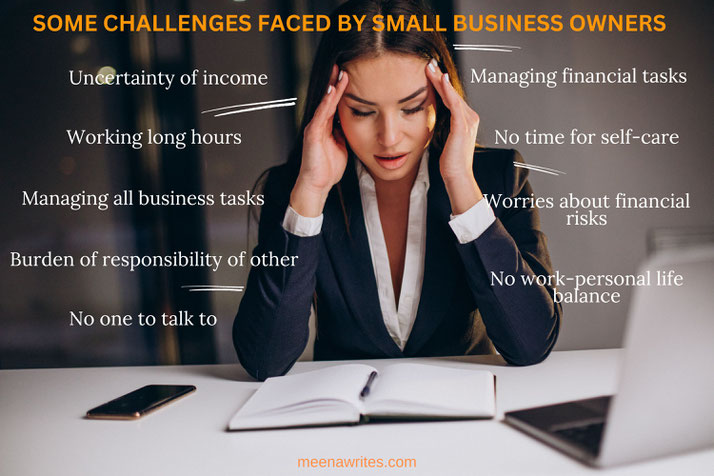
Yoga For Better Mental Health of Business Owners and Entrepreneurs
Did you know being a business owner makes you more susceptible to mental health problems? According to a 2019 Australian Government research on Small Business Owners (SBOs), nearly one in three SBOs (28%) reported a diagnosis in the last 12 months of either stress, depression, or anxiety even though most SBOs felt that what they do is worthwhile and were most likely than not to rate themselves as happy.
Starting or running a business can be exhilarating and hugely rewarding. But the responsibility of running the business and making sure it remains financially viable can take a toll on you, affecting your mental health.
For business owners to function optimally, they require to be on top of their game both mentally and physically. Mental health is as important as physical health and is the cornerstone of many business activities that require creative thinking, problem-solving, planning and decision-making, and other cognitive skills. That’s why it’s vital to take preventative steps and find the right support to look after your mental health.
Yoga is one such activity showing positive results both for physical and mental health in those who practise yoga and can be an effective option for business owners and entrepreneurs to help look after their mental health. But first, let's look at the impact of running a business on the mental health of business owners.
What is the mental health cost of running a business?
Business owners and entrepreneurs pursue their ideas with passion, focusing on their business and often sacrificing their personal time to work on their business activities.
According to Dr. Hokemeyer, a clinical and consulting psychotherapist, who spoke at the World Economic Forum, “Entrepreneurs are trained to ignore the qualitative needs of their well-being measured in meaningful and authentic relationships, overall life satisfaction and happiness.”
When business owners ignore their wellbeing, it not only erodes their productivity and effectiveness as business owners, but it also affects their long-term physical, mental, and emotional health.
“The message they have internalized from the field’s most celebrated entrepreneurs is the outdated prescription of ‘no pain, no gain’ and a pernicious message that success is purely measured in quantitative returns, return on investment and profit,” Dr. Hokemeyer explains.
The pervasive phrase of "no pain, no gain", which became popular in the 1980s, refers to the belief that pushing yourself harder will yield better results. Coined by Jane Fonda in her aerobic videos, to spur people to workout beyond the pain in their muscles, this phrase slowly became internalised, resulting in transformed social and cultural attitude and mindset that measures a person’s value, their work ethic, and code of conduct in terms of how hard they work and what successes they achieve.
This kind of mindset and expectation in business owners puts the pressure on them to perform relentlessly, often at the cost of their health. The need to produce results and deliver them at all costs takes over their lives and health, leading to stress, anxiety, burnout, and mental fatigue.
State of mental health of business owners
In 2015, University of San Francisco researcher Michael A. Freeman conducted a study focused on the mental health of entrepreneurs. According to this study, 72% of entrepreneurs self-reported mental health concerns.
While some of the mental health issues like bipolar, depression, substance abuse, and ADHD may be contributed by family and personal history and may not be directly related to being an entrepreneur, these conditions are more likely exacerbated by the lifestyle of an entrepreneur, which involves putting in long hours, working intensely, and blurring the lines between business and home.
According to the 2019 Australian report on SBOs, the main factors contributing to stress in SBOs are financial concerns and concerns about the impact on family and personal life.
For many small business owners, the success or failure of the business depends on them. They take on all the responsibilities of managing their business and encounter unique challenges along the way, which can put major pressure on their mental health and that of their staff.
Some challenges faced by small business owners include:
- Uncertainty of income or not having a steady cash flow, especially when starting out.
- Managing all the tasks required to run a business and working long hours, especially when getting the business off the ground.
- Feeling responsible for their staff and their family members.
- Blurring the lines between work and personal life as business owners try to cope with the demands of the business.
- Coping with financial issues and managing financial tasks.
- Not having anyone to talk to about the challenges business owners face.
- Not having the time for self-care or personal interests and prioritising business over family and personal life.

Yoga: An effective option to improve mental health of business owners
We can’t ignore the benefits of exercise on mental health, whether it is Zumba, swimming, jogging, walking, or Pilates. People who exercise have an enormous sense of wellbeing, and even 15 minutes a day can be effective in reducing the risk of depression. It also relieves stress and anxiety and helps you sleep better, besides improving your memory and giving you a boost of energy.
According to a 2011 study, yoga not only improves your physical health—enhancing muscular strength and body flexibility, improving cardiovascular health and reducing chronic pain—it also reduces stress, anxiety and depression, improves sleep and enhances the overall quality of life. It also improves mood and boosts concentration, memory, and focus.
A yoga practice combines both the benefits of physical activity and mindfulness and can be a wonderful option for business owners to improve their physical health and ease stress, anxiety, and depression.
What are the mental health benefits of yoga?
Yoga is an ancient form of exercise where you move your body through various poses and postures while regulating your breathing. It focuses on strength, flexibility, and deep breathing.
Kristy Manuel, founder of Vida Yoga and certified yoga teacher with the IYTA (International Yoga Teachers Association) who has been teaching for 15 years, says, "The benefits of yoga are physical through the practice of the postures (asana). Stress levels may also be improved when the tools which yoga provides, such as breathing exercises (pranayama), meditation and relaxation, are practiced regularly."
A recent research lead by the University of South Australia found that movement-based yoga improves the mental health of people living with depression, post-traumatic stress, schizophrenia, anxiety, alcohol dependence and bipolar, and the more yoga they practiced, the more they benefited from it.
The researchers defined “movement-based yoga” as any yoga that included 50% of physical activity; specifically, that form of yoga that requires holding poses and flowing through sequences of postures.
There are various yoga styles, from the physical aspects of Hatha yoga and Vinyasa yoga to the gentle movement of Yin and Restorative yoga. Whatever style of yoga you choose to practice, they all have tremendous benefits for the body and the mind.
Let’s look at 3 mental health benefits a business owner can gain from practising yoga regularly: increasing awareness, building resilience, and fostering better coping of emotions.
Increase Awareness
There is a strong connection between yoga and mindfulness, which can also be called awareness.
Practising a downward dog pose or trying to balance during a tree pose requires a certain amount of awareness of your posture and your body. The focus is on your breath, without overwhelm, and your mind is calm as you move through the postures.
Over time, and with practice, your awareness increases and develops into an inner awareness as you begin to focus on your body’s movement and your breath in the present moment. This is what mindfulness is all about—being mindful or focusing your attention on the present.
“When yoga is practiced slowly and with awareness, that is when real positive changes can be made to the state of the nervous system and the brain,” says Manuel, who is an advocate of slow mindful yoga. “Life can be so busy, especially for business owners, and to have something in their lives that enables them to slow down physically and mentally is a game changer. Practising yoga becomes a time of essential self-care for them.”
As your self-awareness increases, you also begin to understand your emotions, triggers, and patterns in life by observing what is going on in your body and your mind.
“One component of mindfulness in yoga is that when we notice how we are feeling (interception) we can use the tools of yoga to efficiently regulate the nervous system,” explains Manuel.
By increasing self-awareness, you gain clarity, and you begin to develop a positive attitude towards yourself and others. With awareness, composure, and a clear mind, you can then choose to make positive changes, shift your perspective, and find inner peace and calm.
Build Resilience
Business owners face various types of challenges, some of which can be quite stressful. Over time, these stresses, if not managed effectively, can take a toll on their mental health and lead to chronic stress.
An important trait for business owners is resilience, which helps them navigate through the ups and downs of their business. Fortunately, resilience can be developed through practising yoga.
“Resilience is the capacity to quickly and effectively respond to stressors (internal and external, physical and psychological) as they arise, and return to a state of balance and clarity,” says Manuel. “The intentional movement of the body is important in creating greater resilience and a yoga practice gives you many options to do so.”
As you move through various postures, you will encounter both easy fluid movements as well as those poses that can be quite challenging, and perhaps a tad frustrating.
With yoga you become more mindful of how you react when you face such challenging postures (which also translates to challenging situations in your business or life) and can make an intentional choice to embrace the pose (adversities, uncertainty, and change) while learning to adapt.
The process of adapting to change takes place in your brain, which loves novelty. Brain research shows that new experiences trigger dopamine, also known as the ‘reward chemical’, which arouses your interest and drives learning.
So, while you are staggering all over trying to balance in a Half Moon pose, your brain is intrigued by the newness of the pose (inspiring you to get out of your comfort zone) and motivates you to explore your posture further in search for a reward (e.g. being able to stay in the pose for 2 seconds longer), thus building resilience as you keep practising.
Cope with Emotions
Unexpressed emotions (such as the ones related to business concerns) often manifest as physical tightness and pain, disease and illnesses, poor emotional regulation, inability to think clearly or make decisions, and can develop into stress, tension and depression.
Practising yoga asanas along with deep breathing can help you relax and release built-up emotions that are trapped in your body through intentional movement—movement with the purpose of staying in the moment in a meditative state. These types of activities release muscular tension, which unravels the emotions trapped in that part of the body. That’s why you may have heard of people crying during an intense workout, or a yoga session, or after a massage.
Though this isn’t supported by valid scientific studies, energetic medicine identifies the build-up of emotions in the body as blockages of energy or life force or prana. Practitioners of energetic medicine believe that yoga releases these emotions by breaking down the energetic blocks often stored as trauma. The slow and steady breathwork in yoga increases your awareness of your emotions, including the ones that you are not aware of or have forgotten about. This inward focus not only draws out the emotions, but it also helps you see new perspectives and gain new insight.
At a physical level, yoga enables the muscles of your body to tense up (when you are holding a yoga pose) and then offers a significant release. This is known as progressive muscle relaxation, which helps relieve tension and anxiety, improves blood pressure and induces relaxation, which can lead to better sleep.
With progressive relaxation, a group of muscles are isolated and tightened for 8 to 10 seconds and then relaxed. This process continues as all muscles in the body relax. Muscles that are tightened and then allowed to rest will experience a more relaxed state. Relaxed muscles require less oxygen and with that, your breathing slows down and deepens. This relaxed state also results in a slower heartbeat. Your blood pressure also drops, and your blood circulates throughout your body, making you calmer and more relaxed.
Yoga practice also influences your autonomic nervous system. Studies show that yoga activates the parasympathetic nervous system, which relaxes your body after a stressful event or danger.
When you experience stress or face any threat or danger, your sympathetic nervous system is triggered. While this system increases your heartbeat and pumps more blood to give you energy and heighten your senses, the parasympathetic nervous system triggers the relaxation response resulting in lower heart rate, blood pressure and respiratory rate. The parasympathetic nervous system slows the stress response by releasing oxytocin and prolactin, which are ‘feel-good’ hormones secreted by the pituitary gland. This makes you feel better, as your mind and body returns to a state of balance while regulating your emotions.
Manuel informs us that when it comes to emotional regulation, the condition of the nervous system and the state of mind are also crucial. According to psychiatrist Dan Seigel, there is an optimal zone for the nervous system, which he coined with the term “The Window of Tolerance” in 1999. “When we’re in the Window of Tolerance, we think clearly, receive and process information well, and respond appropriately to the situation at hand,” explains Manuel. “Practising yoga mindfully in a way that helps us regulate the nervous system can help widen the Window of Tolerance, and therefore we can handle stressors more effectively.”
How can busy business owners start a yoga practice?
“It is important to know that you don’t need to always do a long practice to get benefits,” says Manuel. "In fact, there are many good yoga classes online nowadays with options for short practices that you could use as a break in your day, or try longer practices to begin or end your day."
Practising a few yoga moves at work can also do you a world of good. While laying down your yoga mat and breaking out into a warrior pose at the office seems incomprehensible to you, there are moves you can practise while at your desk. “You could do some releasing movements in your chair and get great relief for your neck and shoulders and boost your energy levels and concentration,” says Manuel.
Taking a few minutes to do some stretches and yoga at your desk can improve your mood, increase productivity, and also reduces tension in your neck, spine and shoulders.
“I recommend business owners to have regular movement breaks throughout their workday, especially if they spend a lot of time sitting," advises Manuel. “An example of this would be standing up and reaching the arms overhead with an inhalation and letting the arms lower back down on the exhalation. Do this 6 times. You will feel a shift in your energy and it will also help lengthen your spine."
Although you will feel some benefit from one session, it is the regular and consistent practice of yoga that reaps ongoing benefits and deeper changes.
Manuel recommends a mindful yoga practice for your wellbeing. “Find a class that includes a focus on the breath as this is such an effective and powerful tool.”
As busy business owners, finding the motivation to attend yoga classes can be difficult. That is why it’s important to look for a class that you enjoy. Engaging with people in your class and interacting with the yoga instructors is a great way to stay motivated and feel excited about your practice.
It also helps to schedule your classes or practice sessions (in case you are engaging in home yoga sessions) into your calendar, just like you schedule your business activities and other commitments in your daily life. This way, you set aside time for yoga and for yourself.
Look after your mental health with a yoga practice
For busy business owners, yoga can be the ideal mind-body intervention for mental and physical health. By building awareness, resilience and better emotional health with a regular yoga practice, busy business owners like you are in a better position to handle the pressures of running a business. You can also be aware of the early warning signs of mental health struggle and seek the support you need to enhance your wellbeing.
Remember, it’s important to be aware of any signs or behaviours that indicate you are struggling. These signs could be:
- Increasing tiredness or fatigue
- Lack of concentration
- Avoiding social situations
- Feeling frustrated with tasks and with others
- Finding it difficult to make decisions
- Being overly emotional
Seek support and talk to a healthcare professional if you notice these signs or behaviours or if you are struggling with your mental health.
The following resources can be helpful if you want to start a regular yoga practice for your mental health:
- Yoga exercises in the Harvard Business Review
- Sandy Blaine’s book, “Yoga for Computer Users” (which has helped me a lot!)
- Vida Yoga's mindful yoga classes available in-person and online.
Want to pin this post?
Share the love with these Pinterest-friendly images! Thanks!
If you need an experienced health and wellness content writer to help you write regular blogs for your business,
Contact Meena Writes




Write a comment
anniesingh (Saturday, 06 January 2024 04:58)
Hi, nice post